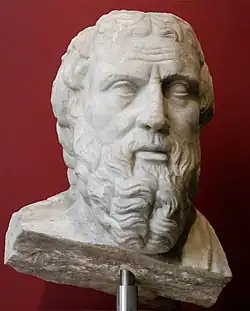History

Herodotus (c. 484 BC — c. 425 BC), often considered the "father of history"
Those who cannot remember the past are condemned to repeat it.[1]
—George Santayana
History is the study of the past. Events occurring before the invention of writing systems are considered prehistory. "History" is an umbrella term that relates to past events as well as the memory, discovery, collection, organization, presentation, and interpretation of information about these events. Historians place the past in context using historical sources such as written documents, oral accounts, ecological markers, and material objects including art and artifacts.[2]
Resources
History Categories
History (21 cats, 164 pgs)
History by country (17 cats, 1 pg)
Ancient Greece (2 cats, 4 pgs)
Critical History (5 pgs)
Federal Writers' Project – Life Histories (406 pgs)
General History (3 cats)
Historical Subjects by Area (5 cats, 1 pg)
Historical Subjects by Period (4 cats)
Historiography (3 pgs)
History by topic (16 cats, 5 pgs)
History courses (3 cats, 8 pgs)
History of Sciences (2 cats, 1 pg)
History/Lectures (1 cat, 23 pgs)
History/Lessons (4 pgs)
History/Resources (5 pgs)
History/Timelines (10 pgs)
History of Mathematics (3 pgs)
Meta Categories in History (2 cats)
Music history (1 cat, 3 pgs)
Philosophy of History (11 pgs)
Pragmatics/History (19 pgs)
Revolutions (2 cats, 3 pgs)
See Also
- Portal: History
- Wikipedia: History
- MIT: History Courses
- Open Michigan: History Courses
References
- ↑ George Santayana, "The Life of Reason", Volume One, p. 82, BiblioLife, ISBN 978-0-559-47806-2
- ↑ Wikipedia: History
This article is issued from Wikiversity. The text is licensed under Creative Commons - Attribution - Sharealike. Additional terms may apply for the media files.